
..........................................................................................................................................................................................................
raleigh 125 years 176pp illus. £40
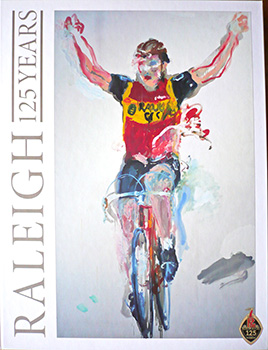
many have marvelled at the amount of money ploughed into team sky, from the jaguar team cars, two death star plush coaches, and then there's the tie-up with rapha clothing for 2013 and beyond. in the language of professional cycling, the fewer sponsor logos that appear on the jersey, the larger the sponsorship budget. sky's team apparel seems only to mention the jersey provider, sky and ig markets. oh, and the thin blue line. the surrounding plushness hardly becomes dave brailsford's professed love for marginal gains.
they are, however, not the first to present a united and sophisticated front to cycling's aficionados. there is little doubt that a well presented cycling team, with smart, matching jerseys can do little but provide the ultimate bang for buck on behalf of the sponsor(s). and with the improved tv coverage available nowadays, it makes riders much easier to identify from the helicopter shots.
in the early 1970s, erstwhile eurosport commentator david duffield was marketing manager at raleigh's head office in nottingham. tom barnsley, director of both tube investments and raleigh industries charged him with the task of setting up a professional cycling team. though a household name across the world, the raleigh brand had failed to gain a foothold in europe, mostly due to the various import duties levied on behalf of each country. thus only the well-off could afford a raleigh bicycle.
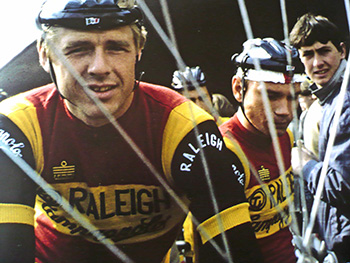
however, britain's joining of the european economic community (at that time known as the common market) dispersed such tariffs, opening a whole new market for the nottingham brand. management saw the formation of a professional cycle team that would compete in all the major classics as well as the big tours, thus shifting the marque's emphasis from track to the road. duffield met with peter post at the london six day race, a well-respected former racer and offered him the job of team director. "he was just the man i needed'. post turned him down. however, one of the brands that came under the raleigh umbrella was that of gazelle, previously owned by wim breukink, but who had recently sold out to raleigh. he persuaded post that the position would be very much to his advantage.
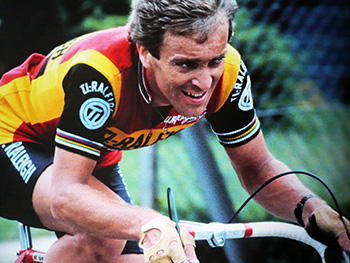
therefore, in 1974, raleigh built a factory in ilkeston to handbuild the team's racing bicycles. 'so our story begins and is a happy reminder of bygone days, when dutch riders wearing the familiar red, yellow and black jerseys produced a unique string of victories in the international cycling arena, making raleigh a household name on the european continent to complement its already famous reputation in the rest of the world.'
i think it commendable and a little left of centre that raleigh chose to celebrate their 125th anniversary with a book depicting the ten years in which those red, yellow and black jerseys infiltrated every european podium. more commonly such an historic landmark would have endowed us with a blow by blow account of the company history over the years. so far, so unpredictable. revered riders such as henk lubberding, joop zoetemelk, johan van der velde, gerrie knetemann and jan raas were a part of the ti raleigh team over the years between 1974 and 1984 during which they won the grand prix des nations, ruund um den henninger-turn, tour de suisse, the four days of dunkirk, stages in the tour de france, amstel gold, ronde van vlaanderen and a considerable number of other prestigious races.
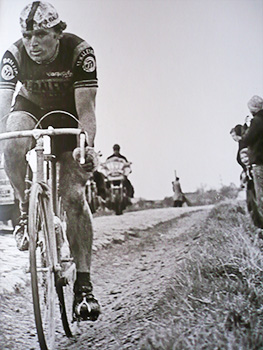
each chapter of the book is introduced over the course of two pages, stating the principal twists and turns that took place and the protagonists of which we should be aware. bizarrely, the narrative reads like the voiceover that accompanies many a tv or cinema documentary. to wit...
'When Post takes stock at the end of the cycling season, he once again has reason to be pleased. But midway through the season, things seem very different. Then, the lacklustre performances of classification riders Zoetemelk and Van der Velde in particular are not up to scratch.'
it's a style that is mildly irritating to begin with, but its consistency gradually lessens as the chapters fly by. however, i defy anyone to acquire this book on the basis of its writing. the whole raison d'etre of this publication is to display the utterly fabulous photography, much of which has likely not seen the light of day before filling the majority of this volume's pages. printed in both colour and grainy black and white, these are truly to die for; fascinating to see the apparel of the day and just as important, those beautiful, campagnolo equipped steel bicycles, all with downtube gear levers and one or two, if my observational skills are as honed as i'd like you to think they are, replete with band-on pump clips atop the seat tubes.
fabulous.
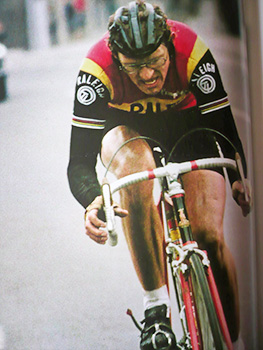
the narrative contains many an insight into the behaviour of both riders and management; it's not just the bikes that have changed. peter post was, by all accounts an extremely hard taskmaster, but that's hardly telling you anything you didn't already know.
'That evening the rest of the team are in their rooms, when two riders, Frank Hoste and Johan van der Velde, decide to have a drink at the bar, clearly breaching the rules laid down by Peter Post. When Post walks past unexpectedly, it's already twenty to eleven. Hoste: 'He saw us, but didn't say anything. We knew what was coming. Next morning after breakfast, Post came to my room and really let me have it. When he left, he slammed the door so hard it's a miracle it was still in one piece.' Dominic Hoste is despondent. 'I thought, I might as well tear up my contract. Post said to me, "I'll pay you till the end of your contract. But I'm leaving you home in future. You won't be racing again."
i cannot deny that this inhabits the world of coffee table books, but it truly is no less desirable for acknowledgment of that fact.
thursday 4 october 2012
 ..........................................................................................................................................................................................................
..........................................................................................................................................................................................................